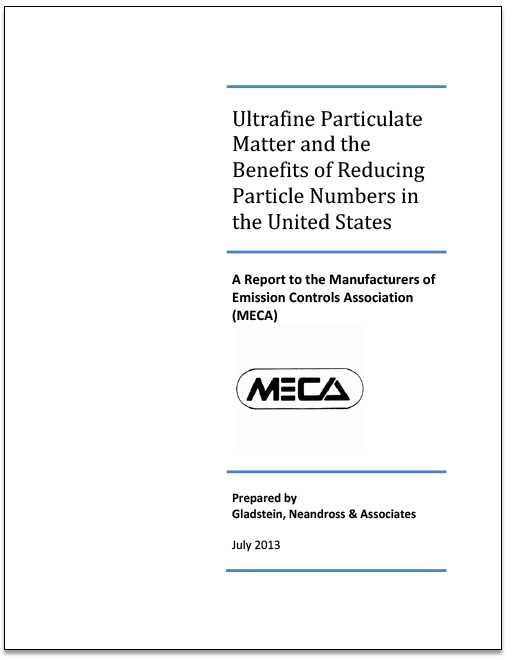July 15, 2013
Evaluating the impact of emission reduction technologies on public health and the environment
In recent years, regulatory efforts in the United States, California, and Europe have significantly reduced the adverse health impacts of pollution from various transportation sources. Key initiatives include the EPA’s reduction of sulfur in fuels, leading to cleaner emission technologies, and a series of rules targeting heavy-duty, nonroad diesel, and locomotive engines, projected to prevent 21,400 premature deaths and generate over $152 billion in health benefits annually by 2030. Furthermore, the EPA’s Tier 3 program aims to lower gasoline sulfur content and set stricter emission standards for light-duty vehicles, complementing the 2011 fuel economy and greenhouse gas standards that target a fleet average of 54.5 mpg by 2025. These efforts align with California’s stringent emission standards and address emerging concerns about ultrafine particulate matter (UFPs) and the effectiveness of Diesel Particulate Filters (DPFs) and Gasoline Particulate Filters (GPFs) in reducing emissions beyond current standards, underscoring the need for further research and regulatory harmonization to maximize health benefits.
Download the Ultrafine Particulate Matter and the Benefits of Reducing Particle Numbers in the U.S. White Paper
Publish Date: July 2013
Client: Manufacturers of Emission Controls Association (MECA)
This white paper was authored by GNA, which is now TRC’s clean transportation solutions team.

Sharing Our Perspectives
Our practitioners share their insights and perspectives on the trends and challenges shaping the market.

Grid Resiliency: Perspectives Across the Power Grid
April 16, 2025
In today’s changing energy landscape, grid resiliency is a top priority for all power system owners and operators. The ability to absorb disruptions and maintain power is crucial in an increasingly unpredictable world.

Take the Right Approach to Implementing DERMS
March 27, 2025
Implementing DERMS can come with challenges. By understanding the unique challenges related to DERMS and adopting the appropriate strategies to mitigate potential pitfalls, utilities can effectively integrate and coordinate DER deployment to align with regulatory commitments and broader business objectives.

How ISOs, RTOs and Utilities Can Effectively Manage Massive Data
March 20, 2025
In today’s rapidly evolving energy landscape, Independent System Operators (ISOs), Regional Transmission Organizations (RTOs) and utilities face unprecedented challenges in managing vast amounts of data.

Download Whitepaper: 10 Years of Insights for Clean Community Microgrids
March 1, 2023
Clean, community microgrids represent a promising and timely opportunity for you to advance your customer offering and deliver meaningful societal benefits, all while modernizing your grid and providing you with load flexibility.

Decarbonization: A Systems-Level Challenge and Actions to Address Climate Change
December 7, 2021
Carbon elimination of the magnitude needed to address climate change requires systems-level change that can only be reached by incremental, ground-up progress, building upon what we have achieved thus far.

How Do Energy Storage Systems Work?
October 18, 2021
For more than five decades, TRC has brought efficient, resilient energy systems to the world. We understand the challenges of implementing energy storage projects.

City of Camarillo, California approves moving forward with Hybrid Solar Microgrids at five critical community facilities
November 6, 2020
On October 28, the Camarillo City Council unanimously approved moving forward with the design of Hybrid Microgrids at five City facilities: City Hall, the Corporation Yard, Camarillo Public Library, Police Station, and Wastewater Treatment Plant. The microgrid at the Camarillo Public Library will be designed with solar+storage only, while the other four sites will employ a hybrid design of solar+storage+diesel.

TRC Digital partners with Dominion Energy to evolve its distributed energy resource strategy
September 22, 2020
Dominion Energy, one of the nation’s largest producers and transporters of energy, has partnered with TRC Digital to evaluate, implement and integrate technology to further the utility’s distributed energy goals. TRC Digital will facilitate Dominion Energy’s strategy development and technology execution, allowing Dominion Energy and its customers to accelerate the shift to distributed energy resources (DER) and net carbon reduction.

TRC Digital and Enbala can help utilities monitor, control and optimize distributed energy resources
April 17, 2020
Distributed energy resources (DERs) are changing the way utilities think about power generation and energy flow. TRC and Enbala can offer utilities a multi-layered solution that highlights the strengths of each company.

TRC and partners win $1 million grant for engineering innovative New York microgrid
April 20, 2017
TRC is proud to support Huntington, NY bolster power reliability and climate-change resiliency with a sophisticated new “community microgrid’’ combining solar energy, a fuel cell, biogas and traditional natural gas to deliver electricity and heat to local customers and institutions.
Start the Conversation
Let’s connect to discuss how TRC can help you drive a more sustainable future.





















